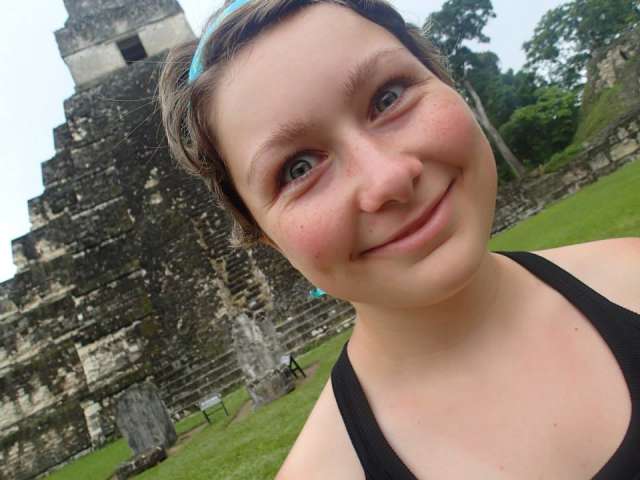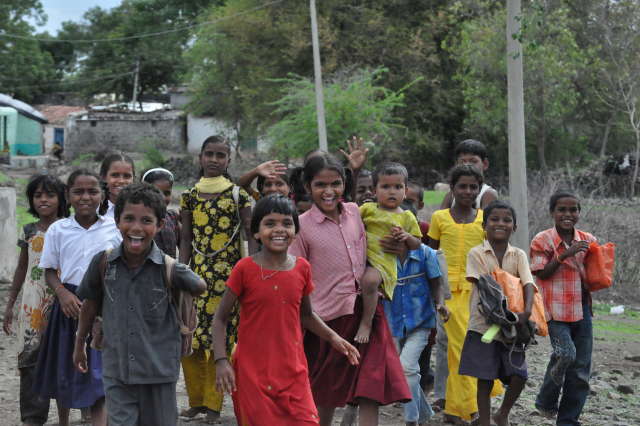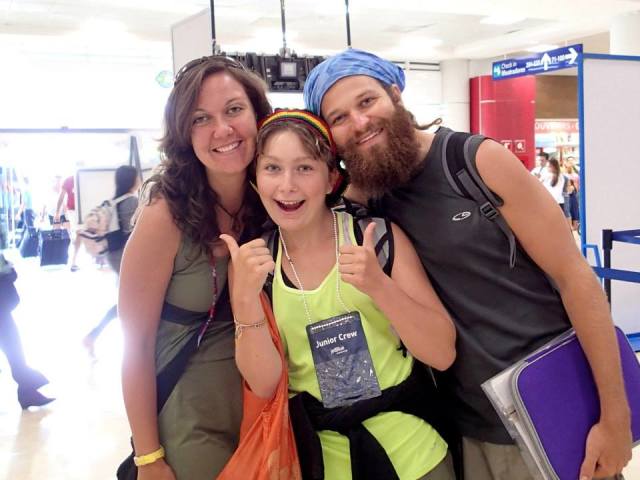A few months ago, my partner, Aaron, and I put a 13 year old from upstate New York on her first international flight home, alone. As I watched her walk through security on her own, I had an overwhelming sense of gratitude for being a part of this moment in time. Here she was, taking her first major leap into independence, and I was the one waving her on her way. Her mom would get to pick her up and be the one to welcome her home with open arms. It felt to me, in that moment, as if this were exactly as this was supposed to go. A trusted adult in her life nudging her forward and her mom waiting at the other end to welcome her home, no matter how far she roamed. That sense of support, of being sandwiched in time between multiple adults hoping for her success and encouraging her capabilities, was no doubt a very good reason why this 13-year-old waved, smiled, and disappeared without a second look back.
I believe that the benefits are so immense that Aaron and I would be remiss NOT to share our travel experiences with young people.
This wasn’t the first time I have taken a child that wasn’t “mine” on an international trip. Some of those trips have gone splendidly and some were more… challenging. All yielded great benefits, some apparent more immediately than others. Anyone who has heard the story of my trip to India with my foster daughter may wonder why I continue to be open to the idea of traveling with young people (and if I am, in fact, insane!). Especially young people that are not “my” children. Simply put, I believe that the benefits are so immense that Aaron and I would be remiss NOT to share our travel experiences with young people.
Here are our top five reasons for happily traveling with other people’s kids.
1. “Education” needs to be re-thought

We are raising a generation of children who believe that “education” only happens in a classroom, and that grades and test scores define their potential. We have taught them that their history books hold the complete history of humanity, and that doing hours of homework is academically preferable to going outside and getting their hands dirty. We have allowed them to believe that there is no reason to leave their corner of the earth because everything they need can be found in a book.
We have lied to them.
Here is a short list of specific things I have witnessed kids learn first-hand while traveling:
- What “needs” and “wants” really are.
- The depths of their own abilities.
- The limits of their own patience.
- The United States has political interests outside of it’s borders.
- There was a genocide in Guatemala, not that long ago.
- Starfish can grow to be quite huge, depending on their environment.
- Some kids that have been adopted by families in the West were kidnapped or sold by their birth families out of true desperation.
- In most of the world, “hungry” does not mean running out of Doritos.
- The Mayans did not predict the end of the world. However, as a civilization, the Mayans were quite advanced in many areas.
- There is some debate over who exactly built the Egyptian pyramids and how.
- What “border control” and “immigration” really look like.
- That “terrorism” is a term not easily defined.
- How to play and communicate with people who do not speak your language.
- Christianity looks very different in different parts of the world.
- There are more religions on earth than they could have imagined.
- Becoming conversant in another language is a challenge.
- The importance of vigilance and an awareness of one’s surroundings.
- “Conservative” and “liberal” are just words and not complete descriptions of a person.
- Where chicken/hamburger/hot dogs/etc. come from.
- How to maximize the output of a garden using various planting techniques.
- The caste system in India is quite different from the definition given in US classrooms.
- Mother Theresa (and others like her) may have been far more human and complex than we like to admit.
- Mothers in many other countries do not think twice about breastfeeding in public, and they certainly do not debate it on social media.
- Almost every social issue is more complex than can be covered in a chapter, a discussion, a class, or even a whole semester.
- How very, very limited history books truly are.
Travel exposes our young people to the vastness and the complexity of our world and provides an education in real time on the world they are living in.
This is a tiny sampling of what I could list here. Not one of these things was found in a textbook, yet many of them seem to be important lessons. Many of these things we learned right along with our young travel companions! I am not anti-reading- quite the contrary – I read quite a bit. But what is missing from books and textbooks is real world experience and application.
Travel exposes our young people to the vastness and the complexity of our world and provides an education in real time on the world they are living in. It allows them to touch, explore, and feel our shared history and to apply their knowledge in moment to moment interactions. Most importantly, travel can effortlessly show you just how much you do not know. Being a part of unconventional education is an honor for us.
2. Exposing children to the world’s offerings

We need to work together to expose our next generation to the wonders, the challenges, the horrors, and the beauty the world has to offer. Our world is almost unimaginably complex, and navigating through life is challenging, no matter who you are. When traveling, the beauty and the horrors of the world are equally likely to come into focus. No one can deny the beauty of the Ganges at sunset or the ugly reality of seeing a 4-year-old child pick through garbage for his next meal.
If we shield young people from the complexities of our world, only to push them out on their own at 18, hoping against hope that they ‘figure it out,’ we are taking a very large gamble.
By choosing to form a supportive web around our young people as they are exploring the polarities of our planet, we are creating the best possible chance that they will grow to be thinking, feeling adults, more capable of responsibly inheriting the earth. If we shield young people from the complexities of our world, only to push them out on their own at 18, hoping against hope that they “figure it out”, we are taking a very large gamble. These are the future leaders and gatekeepers of our planet. Allowing them to travel and explore as young people allows them to explore more widely before they are tasked with leading, creating the potential for more well-rounded, empathetic, knowledgable leaders and community members. If we can be a part of that supportive web that allows for such exploration, we are all for it.
3. Traveling with “other” adults creates trust

Traveling with “other” adults creates sense of trust and belonging in the universe by teaching young people that there are people everywhere interested in helping them become their own best selves. It is a scary feeling to walk out into the world as a new adult and wonder if anyone out there cares about you. For some reason, we repeat the phrase “no one in the real world cares if you (fill in the blank)!”, like it’s a mantra. In fact, most people care very deeply about what our young people do. Most people want to see each young person do well; to become their own best selves. It’s not in our best interest to hope for anything less. Allowing young people the space to have experiences that give them the opportunity to bond with other adults means that our young people develop a confidence that they have options for where to turn if they need help. That there is a vast network of people who care and wish to see them succeed.
Any person who has a sense of belonging and feels support across cultural divides has a much better chance of walking confidently down their own path to become the person they were meant to be.
Allowing them to travel and have these experiences opens their eyes to the fact that their network extends far beyond their own borders. Finally, but perhaps most importantly, it allows them to see that their own best selves are part of a greater whole. There actions have impact beyond what they might have previously imagined, but simultaneously they are still only a piece of that greater whole. All of this has the potential to create a deep sense of belonging within the greater universe for a young person. Any person who has a sense of belonging and feels support across cultural divides has a much better chance of walking confidently down their own path to become the person they were meant to be.
4. Traveling makes you evaluate your own culture

Getting outside of your culture of birth illuminates your own culture in ways that are crucial to developing into an empathic, conscientious adult. Seeing anything from a different vantage point produces a new perspective. One’s home culture is no different. When we are living within our culture, it is challenging to see it objectively. Even when we step outside of it, that challenge still exists.
Seeing anything from a different vantage point produces a new perspective. One’s home culture is no different.
By encouraging young people to step outside of their home culture, we are encouraging them to think critically about even those things that are so close to us, they feel a part of us. Allowing them the gift of viewing their culture from a different vantage point gives them permission to ask questions and explore “truths” they think they know. Creating an environment for a young traveler to see their culture in the context of a vast and complex world jumpstarts the critical thinking most of us do at some point on our interconnectedness and common needs as people.
5. Traveling with children benefits us, too

We recognize that we have as much to learn from the perspective of young people as they do from us. It’s like retaining a new language, if you don’t stay engaged, you lose what you have gained. We need to stay engaged with young people in order to continue to understand their perspectives, insights, fears, visions, and goals. We don’t just travel with young people because it’s good for them, it’s good for us as well. We see places we have been before with fresh vision when we travel with young people. We remember what it is like to experience monsoon rain for the first time or to suddenly realize that the US government has influence that reaches far beyond its own borders. People of all ages have perspectives worth considering and insights worthy of contemplation. When we close ourselves off to the perspectives of an entire generation of people, we lose out.
People of all ages have perspectives worth considering and insights worthy of contemplation.
Whether a child is “mine” or not is irrelevant to my desire to share knowledge and experiences with them. Our children are not property… but they are certainly our greatest asset. They are the thinkers of new ideas, the creators of better ways, and the visionaries of what is possible. When we work together to provide young people with an environment where exploration is encouraged, deep thoughts are navigated, and connections are fostered, we all, without a doubt, benefit in the long run. Knowing this, we happily and excitedly share our travel experiences with “other people’s kids.” How could we not?
To read more about the benefits of travel for young people, check out the following:
